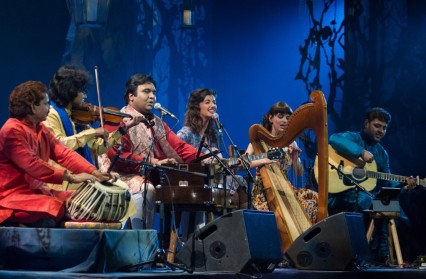Rajvi Glasbrook-Griffiths attended the musical ensemble Ghazalaw featuring Georgia Ruth held at Royal Welsh College of Music and Drama.
Royal Welsh College of Music and Drama, Sunday 15th November 2015
‘Ghazalaw’ as a word is an invention, yoking together the Urdu ghazal, musical vehicle of Arabian poetry, and Welsh alaw, meaning melodic tune.
Ghazalaw, the musical ensemble, are a six-piece led by the sublimely soulful Cricceth singer and songwriter, Gwyneth Glyn, and Mumbai’s Tauseef Akhtar, ghazal aficionado and former protégé of the late ‘King of Ghazal’, Jagjit Singh.
Ghazal’s form has long unabashedly preserved its self-perpetuated highbrow reserve amongst the troubadours, poets and courtly musicians working under the patronage of grand nawabs and emperors. The enticement of courtesans, rhapsodising lust and the appreciation of intoxicating beauty set context for a kind of sensual poetry arranged to music. The ensuing ghazal is then celebrated as the soul of aristocratic high-art and decadent palace life. As the Arab Empire spread through Europe in the 7th Century, starting with the exertion of Moorish influences in Spain and culminating in the Ottoman and Mughal Empires, so it spread its elite code of poetry and courtly conduct. It also translated into the form of Qawwali, the expressive domain of euphoric Sufi mysticism. To envisage, cast your mind’s eye to the whirling, majestic, cinematic wonder of Devdas. Think Mughel-E-Azam.
As ghazal and Qawwali trickled down to the middle classes via radio and film from its elite sphere, it conferred its influence across languages, cultures, religions and boundaries.
Ghazalaw’s performance at the RWCMD was both a melding of form and sound. Ghazal, traditional tabla and harmonium alongside guitar and violin, further coupled with Gwyneth Glyn’s Welsh Folk voice and Georgia Ruth’s pure harp playing was, quite simply, stunning. The first half comprised a performance of music from the eponymous Ghazalaw album, released on Cerys Matthews’ label in September. ‘Teri Aankhon Mein / Seren syw’ combined gorgeously the ghazal with moments of cynghannedd, a Welsh poetic metre. Linguistic and musical connections between Mumbai and Llanarmon played themselves out further through Moliannwn /Ishq Karo where Welsh praise-giving worked itself in with the Urdu urge to love. Parts where Gwyneth Glyn and Georgia Ruth sang along in Urdu in duet with Tauseef Akhtar were enchanting. Equally excellent was hearing Georgia Ruth’s magical harp in counterpart with Ashish Jha’s resonant tabla beats.
Exactly as Ghazalaw mesmerised audiences at WOMEX in 2013, so they did here, albeit to a very different make up. Encompassing a wide age range, in addition to English, I overheard Marathi, Urdu, Punjabi, Gujarati, Hindi, Bengali and Welsh. Sponsored by Wales Arts International and India Centre, Cardiff, this event was a conscious
bridging and connecting of cultures and art, with the Honorary Consul and various other community leaders in attendance.
It is interesting, then, that a form serving as “inspiration to many European poets, notably Wolfgang Goethe, Federico Garcia Lorca and Thomas Hardy…remained cloistered in its middle Eastern and southern Asian heartlands” (notes Andy Morgan).
Tauseef Akhtar’s guru, Jagjit Singh, simultaneously inhabited and, as a Sikh, marked significant departure from that lofty and exclusive Islamic world of ghazal. Furthermore, Jagjit Singh mixed ghazal with modern instruments like the guitar and violin and, through popular film soundtracks, delivered ghazal to the genteel masses. No doubt deemed quasi-sacrilege by the die-hards, this shift was irreversible.
By its definition, Ghazalaw mark a further such departure from tradition, but this time crossing not just class and religion, but continents entire.
The second half of the performance saw Tauseef Akhtar go it alone, without the elements of Welsh Folk brought to the table by Gwyneth Glyn and Georgia Ruth. He sang pop ghazal by the likes of Jagjit Singh and Gulzar familiar to nearly all of the South Asian audience. Renditions of ‘Kaagaz ki Kashti’ and ‘Aahista, Aahista’ were met with enthusiastic applause.
However, this is where the bridging of cultures and connecting between Wales and India seemed to cease. No effort was made to translate into English or Welsh the Urdu and Hindi interactions and humourous exchanges with the audience. Whilst this, on one hand, meant the audience were able to immerse themselves in the authentic experience of a ghazal mehfil, in-jokes and the complete absence of English or Welsh evidently excluded many in the audience. This wasn’t in the spirit of the fusion and coming together of Wales and India so celebrated in the first half of the event.
During that same second half, a man from the audience walked onto the stage, mid-performance, to suggest his own personal favourite. This was just before Tauseef Akhtar broke his flow to complain to the sound-engineer that the guitar was too loud in his earpiece. The latter was unprofessional; the former bizarre. The sponsors already thanked separately by five representatives at the start of the performance were tiredly thanked yet again at the end.
The timing for this concert was aptly planned, as last month’s much-lauded BBC India Season, Narendra Modi’s business-focused visit to London and Diwali celebrations have emphasised our multifarious links with India within British consciousness.
Although one half marked such a disappointing departure from the wondrous togetherness of the other, that other compensated in spades.
(image credit: Eric Van Neuwland)











